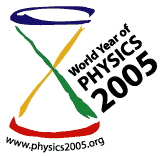
The Department of Physics at the University of Notre Dame will sponsor two events Wednesday (April 20) as part of its yearlong World Year of Physics 2005 observance. Both events are free and open to the public.
The World Year of Physics is a worldwide celebration of physics and its importance in our everyday lives. The observance celebrates the 100 th anniversary of Albert Einsteinsmiraculous yearin which he published three revolutionary papers on special relativity, the photoelectric effect, and Brownian motion.
A daylong conference Wednesday titledCosmology: Physics and Philosophical Perspectives,will be held in Room 100 of McKenna Hall beginning at9 a.m.The event will celebrate Notre Dames heritage as a place where the research interests of physicists and philosophers have intersected in the area of cosmology. The featured speakers are seven scholars whose work has contributed to the ongoing dialogue between the two disciplines: Jeremy Butterfield, Faculty of Philosophy and All Souls College, Oxford University; Bill Stoeger, Vatican Observatory, University of Arizona; Yuri Balashov, Department of Philosophy, University of Georgia; Harvey Brown, Faculty of Philosophy and Wolfson College, Oxford University; Sean Carroll, Department of Physics, University of Chicago; and Ikaros Bigi and Peter Garnavich from Notre Dames Department of Physics.
The cosmology conference is sponsored by the Universitys Joint Institute of Nuclear Astrophysics, the Center for Astrophysics, the History&Philosophy of Science Graduate Program, and the Department of Physics.
At7 p.m.Wednesday, Lawrence Krauss, chair of the Physics Department atCaseWestern ReserveUniversityand author of popular science books such as theThe Science of Star TrekandFear of Physics,will deliver a lecture titledEinsteins Biggest Blunder? A Cosmic Mysteryin Room 131 of DeBartolo Hall.
In 1916, Einstein added a term to his equations of relativity, the so-calledcosmological constant,to properly account for observations of the universe on large scales. Within a decade, however, observations indicated that such a term was not necessary and Einstein discarded the term, calling it hisbiggest blunder.
However, over the past decade new observations have led to a revolution in cosmology. It seems that most of the energy in the universe may reside in otherwise completely empty space, just what would be expected if Einsteins cosmological constant existed.
Krausslecture is part of the Department of PhysicsMiller Lecture Series.
TopicID: 10826